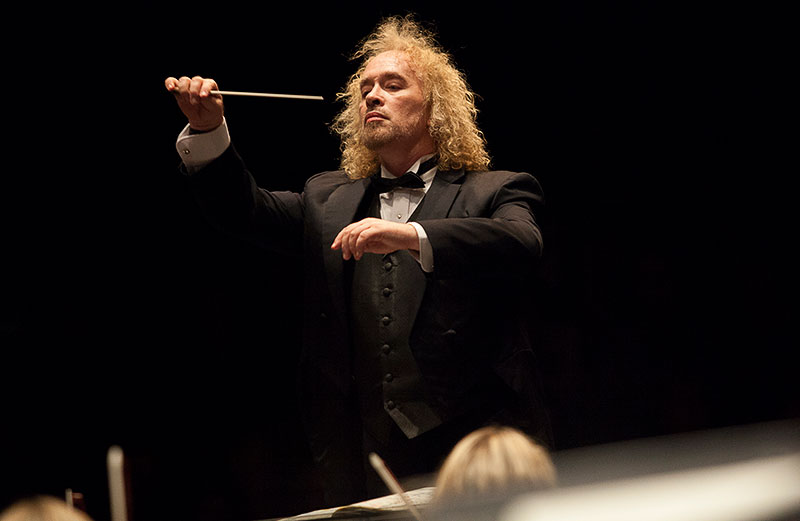Kirk Muspratt
By Jen Banowetz
January 2024 View more Spotlight
Building community is key for this conductor

Under the baton of Muspratt, the New Philharmonic will perform the Best of John Williams on January 20 and 21 at the McAninch Arts Center in Glen Ellyn.
It sounds a bit like Canadian folklore. Kirk Muspratt grew up in Crowsnest Pass, Alberta. “Everybody there was a coal miner,” he says. “My dad was a coal miner. My grandpa was a coal miner. My uncle was a coal miner. My brother worked in a coal mine. And I end up being a conductor in Chicago—if there’s not some magic, I’m grateful for it. It’s precious.”
Since 2004, Maestro Muspratt has helmed the New Philharmonic, the professional orchestra of the McAninch Arts Center at the College of DuPage. (He’s also the music director and conductor of the Northwest Indiana Symphony Orchestra.) He began his career with two degrees in piano from Temple University then headed to Vienna for the conducting program at the Konservatorium. Through the decades, his career has taken him all over the world. At the New Philharmonic, he’s made it a priority to connect with his audience, whether it be through “Just Ask Kirk” cards for audience questions, Cookies With Kirk gatherings, or mingling in the lobby after a performance.
Q: Tell us about your background.
A: Growing up in the Canadian Rockies is my gut, it’s my heart. And growing up in a village that’s isolated, you know every person, and you bond with grandparents, great-grandparents, your peers, their children—you know the names of their kitty cats and their dogs—you’re with them every day. There’s a tremendous heart tie to all of those people and their history, especially considering that when I grew up there, almost everybody who worked in the mines was an immigrant. Everybody spoke another language at home, everybody had their own cuisine at home, everybody either went to the Polish hall or the Ukrainian hall or the Italian hall on Saturday night, and they had their own music, their own dance, their own way of dressing—and that was an enrichment that I don’t know where I could’ve found anywhere else. I believe in a village. I believe in a small town that connects with everybody else; it has great import for me. And I go back there, and if I walk on the street everybody knows me.
Q: How do you compare contemporary music with the classics?
A: I played rock ’n’ roll in high school, but I’m a Bach, Beethoven, Tchaikovsky, Rachmaninoff, Ravel person, and that music will be here 300 years from now when your great-grandchildren are living on Mars. I can’t tell you if ABBA will—and I love ABBA. I think the Beatles might be, but I don’t know. Three Dog Night? Or the Doors? Or the Stones? Or if Bing Crosby will still be loved. All I know is the music of Brahms will be here because it is absolute genius. I think that someone will listen to La Bohème 300 years from now. I don’t know if people will listen to Hamilton. I’m not saying anything bad about Hamilton at all, but if we look at history—what has endured, and what has not endured?
Q: Why do you love programming the music of John Williams?
A: John Williams is an absolute genius, and I put him up there with Beethoven or Rachmanioff, you name it. I know some people want to come stab me when I say that, but he’s an absolute, unbelievable genius. How he comes up with something like Raiders. How he comes up with something like E.T. How he comes up with something like Memoirs of a Geisha. A lot of composers, you hear them, and you know who that is because they end up sort of imitating themselves. John Williams does not. Like that movie The Terminal, all that clarinet music and it sounds so ethnic—that ain’t Star Wars. It’s unbelievable that everything’s fresh. He learned his craft so well. I can tell you that his orchestrations are like reading a Mahler symphony.
Q: What advice do you have for aspiring professional musicians?
A: Of course, follow your dream, follow your gift. But I must ask you—as a young person—to be very careful about this because the world is changing very rapidly in every single way. You are now competing not with just the people in Illinois or America, you’re competing against people all over the world. Also, if you’re not the most disciplined person, there are people who are very disciplined and they come from very disciplined cultures. You’re going to have to compete against them. I’m being very practical—be a double-major or a strong minor in something else you could make a living at.
Photo: McAninch Arts Center





